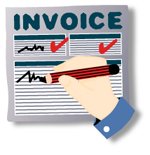 The days of the plain old invoice are gone. Today’s customers can be very demanding when it comes to the invoices they receive. And let’s face it they have a reasonable amount of clout when it comes to getting their demands met. Delaying payment can be a great motivator to giving the customer what they want.
The days of the plain old invoice are gone. Today’s customers can be very demanding when it comes to the invoices they receive. And let’s face it they have a reasonable amount of clout when it comes to getting their demands met. Delaying payment can be a great motivator to giving the customer what they want.
Ideally then vendors should agree with the customer up front as part of the sales process any specific requirements they have for invoicing. This will allow time for the vendor to ensure that the invoice process and more importantly payments are not held up due to problems meeting these requirements.
Following are some considerations when it comes to invoicing. This is not a complete list by any means however provides an insight into the types of issues that might be faced by the billing team.
Customers Invoicing Requirements
Do different customers of the organisation have different invoicing requirements? And as an extension do some Customers even have different invoicing requirements for particular projects, products or services?
Legal Requirements
What are the legal requirements of the countries that Customers reside in for receiving and paying invoices? For example are a certain number of copies required, is a withholding tax exemption form required to be sent with each invoice? For example Google “certificate of domicile of non resident for indonesia tax withholding form dgt 1”
Invoice Level of Detail
What level of detail is to be included on the invoice for Time & Material billings? Is any or all of the following required:- employee name, service provided, date the service was provided, job ticket number, activity description or other details?
Consolidation Level
Are Time and Material Billings required to be consolidated at a particular level on invoice lines, for example ‘total hours by employee for the period being billed’, or is each individual timesheet record for each employee to be represented as an individual line item on the invoice?
Activity Description
Is the actual service activity included on the invoice and if it is then who enters the Activity description and does anyone check this prior to an invoice is produced? Should the Activity description come from the employee’s timesheet?
Product V’s Service invoicing
Will invoices contain charges on the same invoice for different types of items e.g. products, miscellaneous, expense charges, services or are these to be separated onto different invoices?
How will the above affect the potential for the customer to hold up payment of the invoice? If there is a possibility of a query on a billing item then best to separate billings as much as possible so that one issue does not impact other non-related charges from being held up for payment.
Time and Material Services V’s Fixed Price
Will invoices contain charges on the same invoice for Fixed Price services and Time and Material services or are these to be separated onto different invoices?
Single Project V’s Multiple Project Billings
Does the billing system allow for invoices to be optionally generated with billings for either a single selected project, multiple selected projects or all project work for a period or date range? Has it been agreed with the customer as to what charges are to be incorporated onto which invoices?
Ideally we should minimise the number of invoices that have to be produced, due to administrative costs, but only within other constraints such as the possibility of some charges holding up payment of other non-related items on the same invoice.
Customer Order Number
Does the invoice require the customer’s order number to be referenced? Is the order number provided in advance of the project or invoice being sent. There are some arrangements known of whereby a customer issues an invoice approval number following review of ‘Pro-Forma’ invoices. This means that invoices cannot be finalised and sent until this approval number has been provided by the customer and updated to the invoice. Tedious but sometimes the vendor has no choice but to accept the customer’s demands.
Billers
Are there different groups or even different companies within the organisation that have different billing teams and require differentiation when it comes to representation on invoice. 
For example perhaps different Company Registration and tax details are required on the header of the invoice.
There could be a requirement for each Company or Group to have a different Biller name, addresses i.e. for correspondence and perhaps even a different logo to appear on the invoice.
Separate Billing Teams would need to be able to manage the production of invoices only for those Companies or Groups within an organisation that they are responsible for.
Currencies
What currency has been agreed with the customer for invoices to be raised in?
Do some customers require invoices to be raised in more than one currency and is this dependent on the Project, Location or some other criteria?
Taxation
Under what taxation system is the invoice being raised? Is it a Goods and Services Tax, Service tax or Wholesale Sales Tax regime?
Are some products or services provided overseas and if so are they Service Tax free?
Pro-Forma Invoices
Does the customer require a ‘Pro-Forma’ invoice to be issued prior to finalising the invoice?
Are invoices required to be checked by someone other than the billing team prior to invoices being sent? For example the Project Manager or Customer Account Manager.
Invoice Delivery
How are invoices to be delivered to the customer? Is it by Post, e-mail – automated, fax – any or all? Are invoices provided electronically to the Customer? Is this also dependent on the Project, location or some other criteria?
Editing Invoices
Should invoice details be allowed to be changed after the invoice has been generated and sent or interfaced to the Accounts Receivable system? If so what details should be allowed to be changed and by who?
 General Ledger Coding
General Ledger Coding
What requirements are there for general ledger coding of invoices so that sales and revenue appear in the correct general ledger accounts? Is the billing system flexible enough to cope with these requirements and automate the coding when generating invoices?
Billing system interfaced to the Accounts Receivable system
Are invoices interfaced electronically to the accounts receivable system? Will the accounts receivable system cope with customer demands for invoicing? For example can one customer (account in the accounts receivable ledger) accept invoices in multiple currencies?
Revenue Reporting
What level of information is required to be generated in invoices to allow revenue to be reported at the required level of detail? For example, does the organisation require revenue to be reported by Service or Employee? Is this level of revenue reporting required at the Project, Customer, Group or some other level?
And More….
The variety and complexity of invoicing for professional service organisations is significant. Frequently we are met with new and interesting demands for invoicing processes, layouts and invoice content and details.
As long as invoices are produced there will continue to be new and interesting invoicing requirements.
